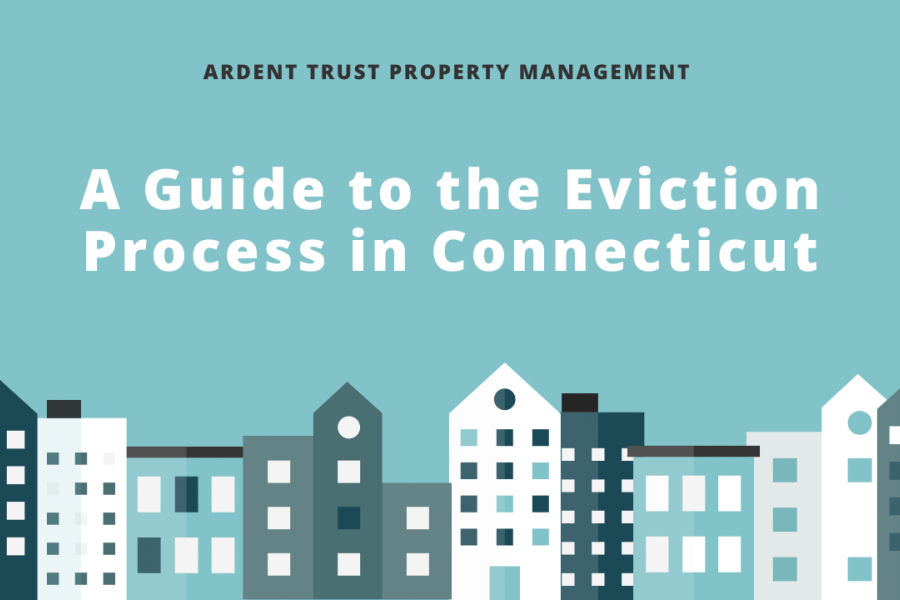
One of the best investment strategies in Connecticut is investing in rental properties. With its stable market with a consistent demand for rental properties, landlords will find plenty of opportunities to earn a steady income.
However, being a landlord also comes with risks. If you are not careful when selecting tenants, you could end up losing a lot of money on your investment. But even if you have a thorough tenant screening process in place, there are times when problems with tenants arise and you will be left with no other choice but to process eviction.
As a landlord, knowing the correct eviction procedure is important to avoid getting yourself in any legal trouble. This guide will help you through the process.
What’s the Eviction Process in Connecticut?
In Connecticut, it may take four to seven weeks to evict a tenant. The length of the eviction process varies depending on the cause. The process may take longer if the tenant requests a continuance or a stay of execution.
Notice for Lease Termination with Legal Cause
Connecticut landlords are not allowed to evict a tenant without legal cause. The legal grounds for eviction are the following:
- Failing to pay rent on time
- Staying at the property after the lease expires
- Violating the terms of the lease
- Being involved in an illegal activity

Landlords are required to send proper notice to the tenants before they can process the eviction lawsuit. There are rules in Connecticut surrounding breaking a lease, whether it is on the landlord’s part or the tenant’s.
Serving a Tenant with an Eviction Notice
In Connecticut, the eviction process begins by serving tenants with a written notice. The length of notice will vary depending on the cause of eviction.
It’s important to note that for certain grounds such as unpaid rent and incurable breach, a state marshal, officer, or person specifically appointed by the court must serve the notice to the tenants. Landlords may serve the notice to respect the request or vacate if the ground for eviction is a curable violation or overstaying after the lease ends.
These are the notices that must be sent to the tenants:
Notice to Quit for Late or Nonpayment of Rent
In Connecticut, the rent for week-to-week tenants is considered late if not paid within four calendar days from its due date, and within nine calendar days from its due date for month-to-month or longer leases.
If a Connecticut tenant is late in paying rent, a 3-day notice to quit will be sent by a state marshal, proper officer, or specially appointed person by the court. The notice gives tenants three days to settle their rent or move out.
Notice to Vacate for Tenants With Expired or No Lease
If a tenant stays at the property even after the lease term ends, the landlord should present them with a 30-day notice to quit to formally end the tenancy. This provides tenants 30 calendar days to move out.

If the tenant fails to leave the property after the notice ends, the landlord can proceed with the eviction lawsuit.
Notice to Comply or Vacate for Lease Violations
If a tenant in Connecticut violates the term of the lease, and the violation is deemed curable, the landlord should send a 15-day notice to comply or vacate. Within this period, the tenant should fix the issue or leave the premises.
If the violation is not curable, or the tenant repeats the same curable violation within a six-month period, the landlord is not required to give them another chance to fix the issue. A state marshal, proper officer, or specially appointed person by the court can then serve them a 3-day notice to vacate and file an eviction case if the tenants refuse to move out after three days.
Notice to Vacate for Illegal Activities
If a Connecticut tenant commits or gets involved in any illegal activity, a 3-day notice to vacate will be served by a state marshal, proper officer, or specially appointed person by the court.
The tenant should move out of the property within three days without any chance to fix the issue. Landlords can then process the eviction if the tenant remains at the property after three days. If the landlord has to repair the unit due to illegal activities, they can legally use the security deposit.
Tenant Eviction Defenses in Connecticut
Tenants may claim that the eviction is not legal as a defense.

Here are the possible tenant eviction defenses in Connecticut:
- Tenants may claim that the landlord tried to forcibly remove them by changing the locks, harassing the tenant, removing their belongings, or shutting off utilities.
- Tenants may also claim that the eviction is retaliatory in nature and a violation of the fair housing laws
- Tenants may claim that the property is not habitable or the landlord violated the terms of the lease
Attending Court Hearing
In Connecticut, a hearing will only be held if the tenant files both their appearance and their answer to the lawsuit on or before the deadlines as ordered by the court. If so, the hearing will be held within seven to 10 days after the court receives the answer from the tenant.
However, if the tenant does not appear for the hearing, the hearing will not push through and the court will make a ruling on the case.
Writ of Execution
If the judge chooses to rule in your favor, the writ of execution will be issued at least five days after the judgment. The tenants have five days to move out of the property before a sheriff will forcibly remove them.
The Eviction
Once the Writ of Execution is issued, it will be posted on the premises by law enforcement. Tenants have 24 hours to leave the property, or else the sheriff will forcibly remove them and their belongings.

The tenant may request a stay of execution for six months or less, except for evictions due to nonpayment of rent, squatters, nuisance, or serious nuisance. If the eviction is due to the tenant not paying rent, tenants may request a stay of execution for up to three months at most.
Bottom Line
Evictions can be complicated, but if you have any questions about the process don’t hesitate to contact Ardent Trust Property Management. We are a full service property management company that is ready to help you with all your rental property needs.
Disclaimer: Please note that the information provided in this blog is intended for general guidance and should not be considered as a replacement for professional legal advice. It is important to be aware that laws pertaining to property management may change, rendering this information outdated by the time you read it.
